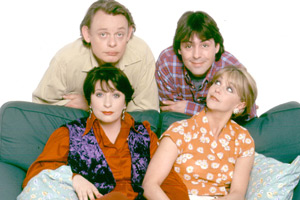30 years of Men Behaving Badly
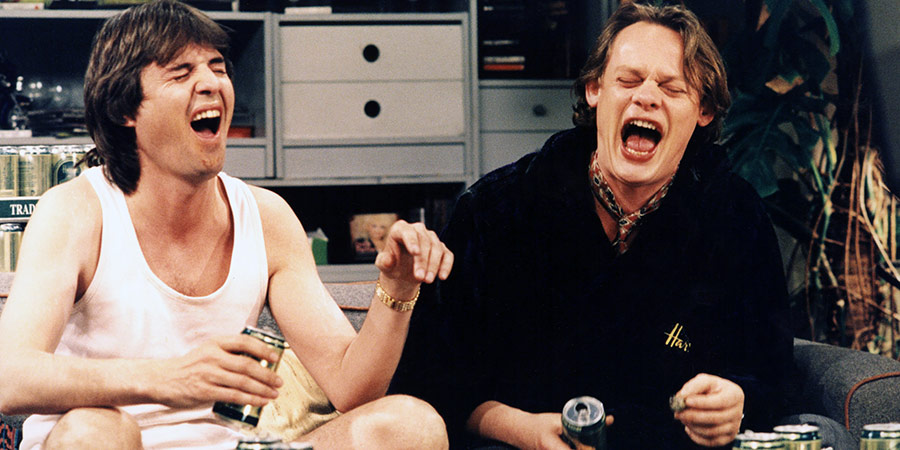
Ask somebody to name a sitcom that typifies the 1990s and there's a good chance their first answer will be Men Behaving Badly. It's hard to believe, but the sitcom turns 30 today (18th February). Viewed today it could be accused of sexism, but what shines through writer Simon Nye's scripts is the warmth. Gary and Tony are as laddish as they come, but there is an innocence to their indolence that belies their other traits.
But before coming up with the comedic excesses that encapsulated the era, creator Simon Nye was a novelist. Men Behaving Badly, the original novel upon which the show was based, was published in 1989. Nye himself has said that it "is not a good book" (hardly a cover quote), but it does go to show that your story doesn't need thousands of readers - just the right one. In Nye's case, this was legendary television producer Beryl Vertue, who thought it would make an excellent television series. It followed the same basic premise of one couple, their flatmate and the girl he lusts after who lives upstairs, and it has to be said that its rapid fire dialogue does read like a script.
Vertue, who died last week at the age of 90, is a name synonymous with quality television. Her daughter Sue, as well as son in law Steven Moffat, are modern-day titans of television. Sue was responsible for comedies as eclectic as The Vicar of Dibley and Mr Bean, while he created and wrote the likes of Coupling and Joking Apart. He also enjoyed an extremely successful stint as showrunner on Doctor Who, for which he commissioned Nye to write the episode Amy's Choice during his tenure.
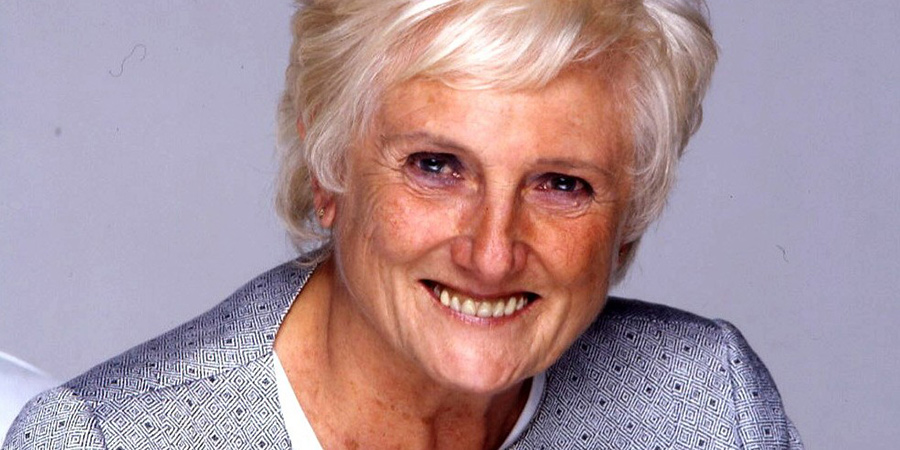
Just as Verity Lambert paved the way in the 1960s, Beryl Vertue was doing the same. Starting out as a secretary at Associated London Scripts, a writers' agency founded by the likes of Spike Milligan, Ray Galton and Alan Simpson, she soon found herself acting as their agent, also representing the likes of Terry Nation, Eric Sykes and Johnny Speight.
Valerie Minifie, who played Gary's perennially put upon secretary Anthea through the entire run of Men Behaving Badly, remembers her as "the most amazing producer, because it was unusual to have a producer be so hands on with the actors, making sure they were comfortable and had everything they needed. She even left gifts in our dressing rooms!"
Of course, it took a while to get to what we now think of as 'classic' Men Behaving Badly. Martin Clunes and Caroline Quentin, playing Gary Strang and Dorothy Martin respectively, were central characters from that start, as was Leslie Ash playing Deborah Burton. But before Neil Morrissey, there was Harry Enfield, already a big name in comedy.
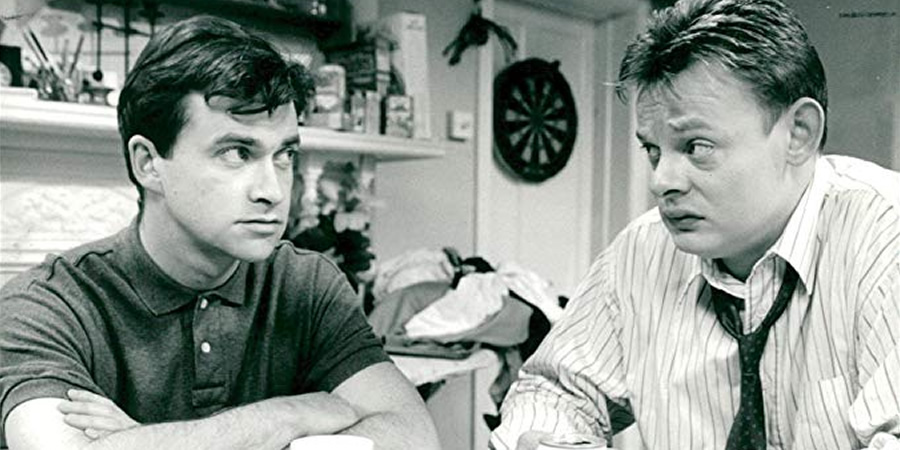
Enfield played Gary's flatmate Dermot Povey, who occupies the role in a way that would stand in stark contrast to Morrissey's loveable innocence. This isn't to criticise Enfield's character; indeed it is Dermot who lands some of the biggest laughs, but his character was more wistful and less laddish.
However, at the end of the first series, Enfield decided to quit. Unbeknownst to everyone except Vertue, Enfield had always been adamant he would only commit to a single series, so when he left it created a huge chasm that had to be filled. Enter Neil Morrissey as Tony Smart.
Morrissey and Clunes were friends before their time on the show, having met in London (as an extra titbit, look out for a cameo from writer Simon Nye as an eerily mute potential flatmate in Series 2, Episode 1), and it was Clunes who recommended Morrissey for the job. The easy chemistry between the pair is obvious from their first scene, and despite their frequent lascivious discourse, Clunes and Morrissey are such likeable performers that no matter how crass their characters descend, they never cross the line into unpleasantness. Likewise, Quentin and Ash match the boys insult for insult, and although Nye admits "my big offence, really, was not writing proper jokes for Caroline Quentin and Leslie Ash" in earlier episodes, he did improve on this charge.
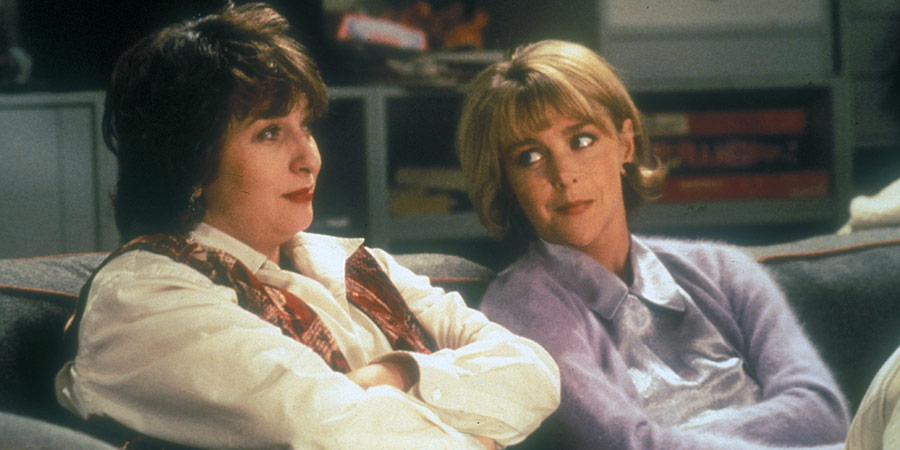
However, after Series 2, the show was axed by its channel, ITV, despite pulling in seven million viewers, a figure rarely matched by modern comedy. Beryl Vertue, seeing Nye's talent and the potential in the show, refused to let it lie, negotiating a move to BBC One that would see the sitcom's popularity explode. The move also meant that the show was broadcast post watershed for the first time, giving Nye more scope to explore the burgeoning 90s lad culture than he had been afforded at the commercial rival. This allowed the lascivious language to flow freely, to the extent that it was even denounced in the House of Commons.
It would perhaps be unfair to single out one episode as the funniest, but perhaps the finest example of everything great about Nye's writing in Men Behaving Badly can be seen in Series 4's In Bed With Dorothy: Gary is forced to become a carer to Dorothy after she has her appendix out, and Nye has great fun in taking this scenario to ridiculous excesses. Meanwhile, Tony is embarrassed by having to wear glasses for the first time. It is this plot that leads to perhaps the funniest scene in all six series, where even Dorothy and Deborah devolve into childishness as they unsuccessfully attempt to stifle their giggles while Gary tries "not to make a spectacle" of Tony.
Aside from the central foursome, the only other characters to appear right from the very first episode were Gary's colleagues - the timid Anthea, played by Valerie Minifie, and the naïve George, played by Ian Lindsay. It is an example of the classic sitcom hierarchy: at home it is usually Dorothy who controls the power dynamic, whereas at the office Gary has the upper hand. But even this comes full circle with the final episode, Delivery, when an inebriated Gary finally admits he cares about them.
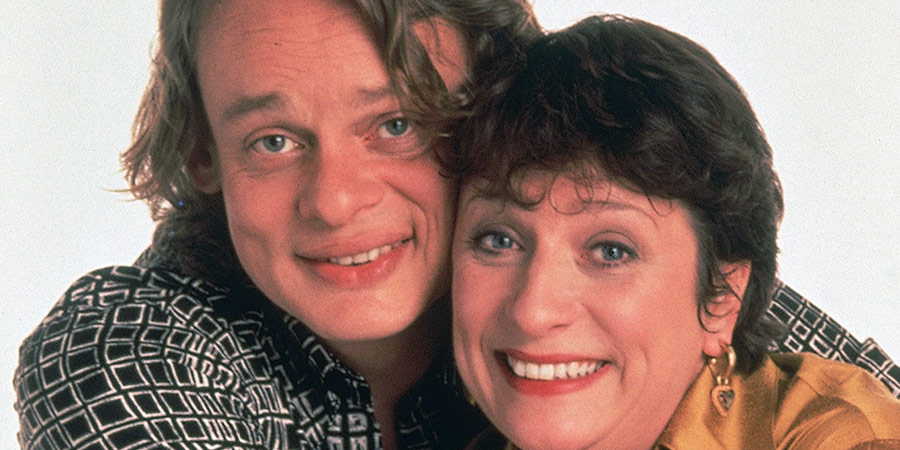
It was at the apex of the Men Behaving Badly's popularity in 1996 that Vertue, as she had done successfully with several sitcoms before, negotiated an American remake. The risqué humour would prove too much for American audiences, but it did chalk up two seasons before being cancelled.
It says a lot about the cultural reach of the original that in 1997 a Comic Relief sketch was put together that finally united Gary and Tony with the woman of their dreams, Australian pop superstar Kylie Minogue. Minogue was no stranger to sitcom, having made a cameo in The Vicar of Dibley just three years previously, and the short sees the former actor playing herself, dropping in on Gary and Tony looking for help - with the gag being, of course, that they don't realise who she is until she's gone.
Nye said of the sketch: "My prized possession is a signed letter from Kylie saying she'll do it. I was delighted. We rescued Kylie's career in the 90s really you know, by having the guys obsess over her... Not true, but certainly we banged on about how great she is. I wasn't even in the country, I was in Australia, so I never met her! But she was a good sport."
Nye rounded out the comedy with three specials in 1997, collectively packaged as Last Orders. While it doesn't wrap up the characters' story with a neat bow, it does reach a point that propels Gary, Dorothy, Deborah and Tony into the next stage of their lives, with jobs and children.
Will the show return? That is a question that has plagued the cast ever since it ended. For Nye's part, he has always said he is open to it should the right idea come along; a viewpoint shared by the cast whenever they are asked. But aside from a short sketch for the Stand Up To Cancer charity appeal in 2014, no further episodes have been forthcoming.
The cast all have fond memories of filming, a fact unsurprising to anyone who has watched the programme's outtakes. Their closeness and camaraderie clearly translated to their characters.
Clunes said: "Without a doubt my favourite set-piece was when Neil tried to take his tooth out. He's really good at that kind of unspoken physical stuff and it was always a hoot to watch him working it all out in rehearsals. The simple truth is that Simon's scripts are just really funny. Beyond that, for me they are much funnier than scripts that just have jokes in them; Men Behaving Badly was so funny because of who said what, where. We all had lines that were funny specifically because they were spoken by our characters in a given circumstance.
"My abiding memory is of warmth and laughter. As a cast the four of us were extremely close on and off screen and we genuinely appreciated each other's stuff. With Simon's scripts and Martin [Martin Dennis, the director] and Beryl at the helm it all added up to a great alchemy, and then to have the success that we did was just the icing on the cake."
Leslie Ash concurs, saying that her favourite set-piece was "Gary and Tony's cheese impressions, and when Tony is hiding dressed at Highlander and we are watching Star Trek. We had all our dialogue on auto-cue that week!"
She explains: "I had grown up with sitcoms such as Steptoe And Son, Dad's Army then Monty Python changed everything and also The Young Ones, so Simon championing the lad culture was totally new. It makes me wonder if, under that quiet exterior that Simon portrays, there is a Gary or Tony lurking, and that makes me laugh.
"When it first aired the press wanted to make out it was sexist but in fact what Simon had done brilliantly was in fact turn the tables and make the boys the figures of fun. I will always look back on my time in MBB as being such an important and enjoyable time in my life and career. All I can remember is the laughter during rehearsals and being part of the coolest team ever."
As Nye said in the introduction to script book The Best Of Men Behaving Badly, "the show has been linked to and even blamed for Lad Culture. Several MPs accused us of dumbing down Britain., to which we could only answer: Well, you started it!"
Men Behaving Badly will always be synonymous with the culture of the 1990s, and the fact that it is so fondly remembered today stands as a testament to the quality of Nye's writing. While he has written many successful shows since, most notably ITV's witty drama The Durrells, the perfect coalescence of cast and crew ensured that Men Behaving Badly will long be remembered as one of British sitcom's greatest success stories.
See also: Simon Nye talks about MBB, and 30 years of TV writing
Help us publish more great content by becoming a BCG Supporter. You'll be backing our mission to champion, celebrate and promote British comedy in all its forms: past, present and future.
We understand times are tough, but if you believe in the power of laughter we'd be honoured to have you join us. Advertising doesn't cover our costs, so every single donation matters and is put to good use. Thank you.
Love comedy? Find out more
